A faithful 1979 MF 240 workhorse
Posted by Chris Graham on 23rd July 2024
Peter Archer bought his 1979 MF 240 15 years ago and it’s proven to be a near faultless worker ever since, as Chris Graham explains.
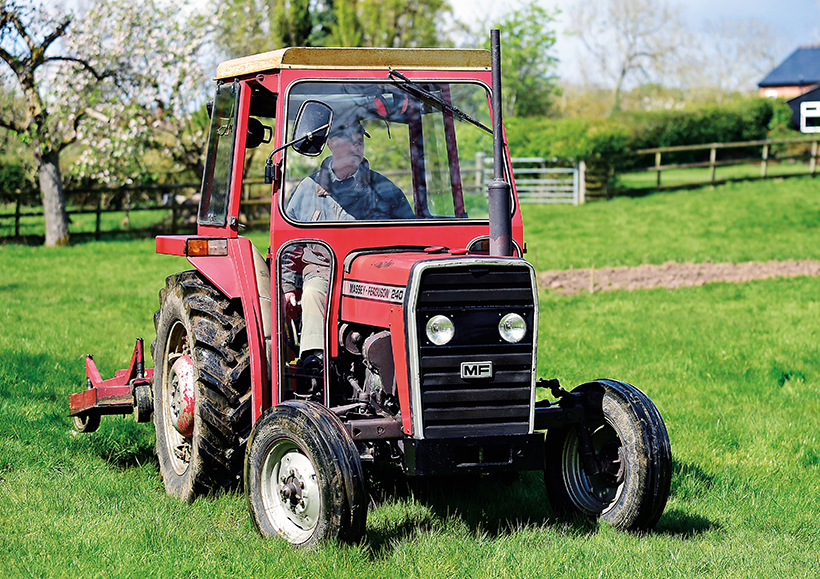
Peter Archer’s 1979 MF 240 has probably trebled in value during his ownership and, he says, it represents a better proposition than having the cash sitting in the bank.
Sometimes you can inadvertently hit the jackpot with a tractor, and I’m not talking here about discovering a long-lost County 1474 in original condition that the disinterested owner is willing to sell for £12,500! No, I’m not referring to money, but to dependable and capable service.
The bottom line is that tractors are utility vehicles that were designed to fulfil a functional role, typically within the agricultural sector. Of course, some were better at it than others, and the good ones soon established reputations for being tough, durable and effective working machines.
Farming heroes
Fast-forward two, three or even four decades, and many of those once willing workers that have survived from the ‘golden days’ of British tractor production, are now in preservation, existing as pampered ‘show ponies’ that get trailered from exhibition hall to show ring in an unrelenting clamour for rosettes.
But, thankfully, a good number of those agricultural heroes from the 1960s, ‘70s and early ‘80s, fell through the restoration net for all manner of reasons, escaping the renovator’s wrench and history-erasing spray gun to enter retirement as original-condition examples with a story to tell.
One such machine is Peter Archer’s 1979 MF 240, a very early model from the successful 200 Series that Massey Ferguson produced between 1979 and the mid-‘80s. Contemporary advertising suggested to farmers that the MF 240 represented ‘the safest investment you’ll ever make’ and that appears to have been pretty much the case, as far as Peter is concerned.
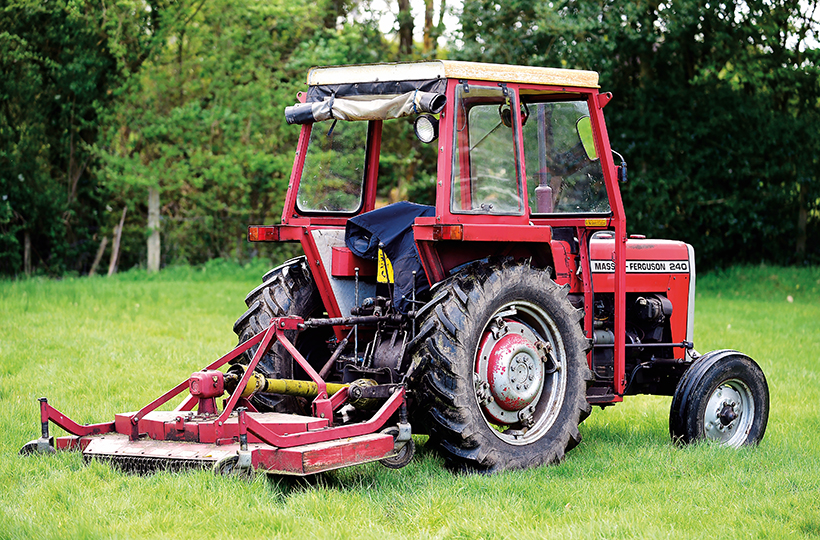
The 45-year-old 240 still works for its living and wears its ‘working clothes’ with pride.
“I was born in the early 1950s and, despite growing up on a farm, opted to become a digger driver as soon as I was 17,” he explained to me. “I’d developed a dust-related allergy so getting away from the corn dryers made sense.
“I enjoyed the digger work and stayed with it for more or less my entire working life and even now, although I’m officially retired, I like to keep my hand in! These days I’m increasingly involved with archaeological digs, which is very precise work.”
A memorable machine
“Back in the day, one of the memorable machines I worked with was a 1971 Ford 13-6 digger, which was based on the Ford 4000. It was quite rare and featured two seats in the cab – one facing forwards and the other backwards. But the company I worked for soon switched to JCBs, although I remember working with a few Massey Fergusons diggers, too.”
Peter added: “Then I spent 10 years or so driving tipper wagons, just for a change of environment, and still keep my HGV licence going today. I started getting interested in classic tractors in the late 1980s. My wife’s father repped for Western Farm Implements Ltd, in Stratford-Upon-Avon, which was a Massey Ferguson dealership in those days, so I got some exposure to the red and grey machines that way. But the first tractor I bought was a 1955 Ferguson TE-F 20, which arrived with me in 1988 and it’s still in my shed today!
“It didn’t require much work; nothing much more than a bit of tidying and a coat of paint. Of course, the parts situation wasn’t nearly as good then as it is now, and I even remember struggling to find the right shade of Ferguson grey paint. In the end I settled for something that looked about right, and left it at that. I think that some restorers go over-the-top nowadays. After all, tractors are working machines and I believe that their appearance should reflect that. In the early 1990s, I started competing in local ploughing matches with the Fergie.”
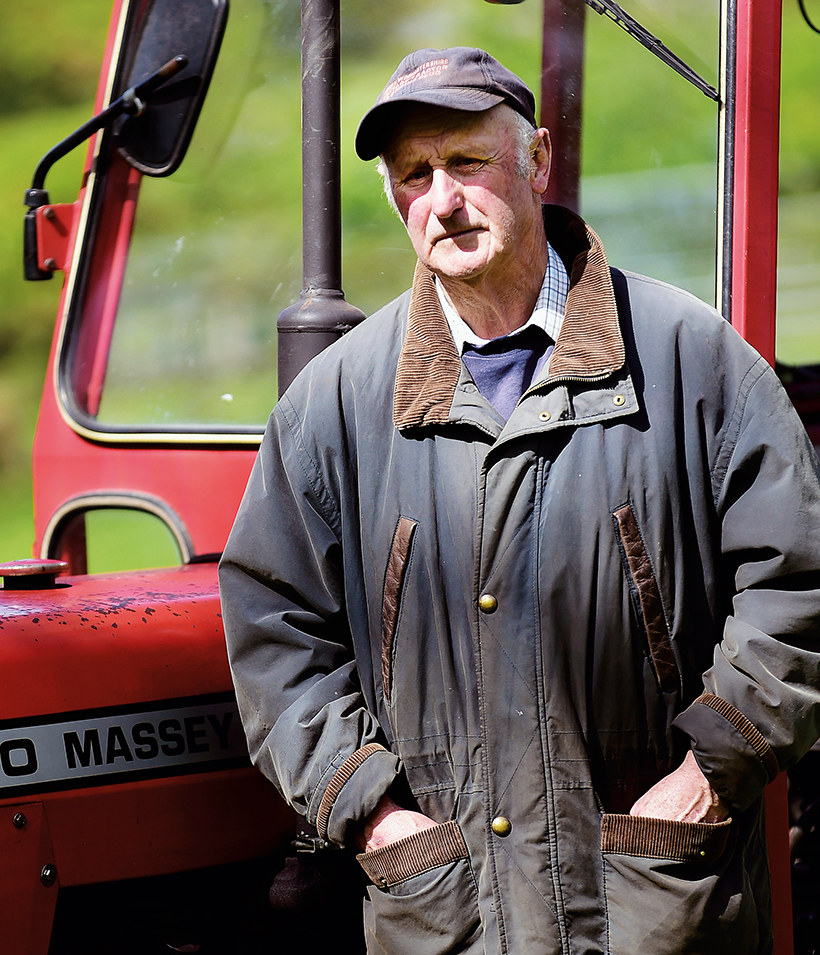
Peter Archer has spent his working life at the controls of diggers and trucks and, these days, delights in using his classic tractors.
Peter then bought an MF 35X but didn’t keep it for long, swapping it for an MF 550. That machine didn’t hang around either, and was replaced by the MF 240.
Shock exit
“At the end of 2008 I was driving tippers but got made redundant ‘out of the blue’ due to the fallout from the financial crash,” Peter recalls. “Fortunately I was entitled to some redundancy money and I used part of that to fund the MF 240.
“That tractor has quite an interesting history. After being made at Banner Lane, in Coventry, it got modified and sent to the National Vegetable Research Centre at Wellesbourne, in Warwickshire. The tweaks included PAV wheels and double spool valves on the back, and I think it worked on-site there for about four years. Then, for whatever reason, it was moved to the Massey Ferguson Training Centre at Stoneleigh Park.
“All I’ve been able to discover about its time there was that it was used as a maintenance machine for the parks and grounds, so nothing much more taxing than a bit of mowing. As a result the hours total stayed low and, by the time I got it, it had only done 1,800. Since then I’ve added about 400, so it’s still done very few.”
Peter first found out about the tractor via a friend in his village, who happened to know a contractor working at Stoneleigh Park. “Part of the site was being redeveloped and the 240 – plus other tractors and machines – had been discovered abandoned in a shed. The premises had to be cleared and I was asked if I fancied anything,” he told me.
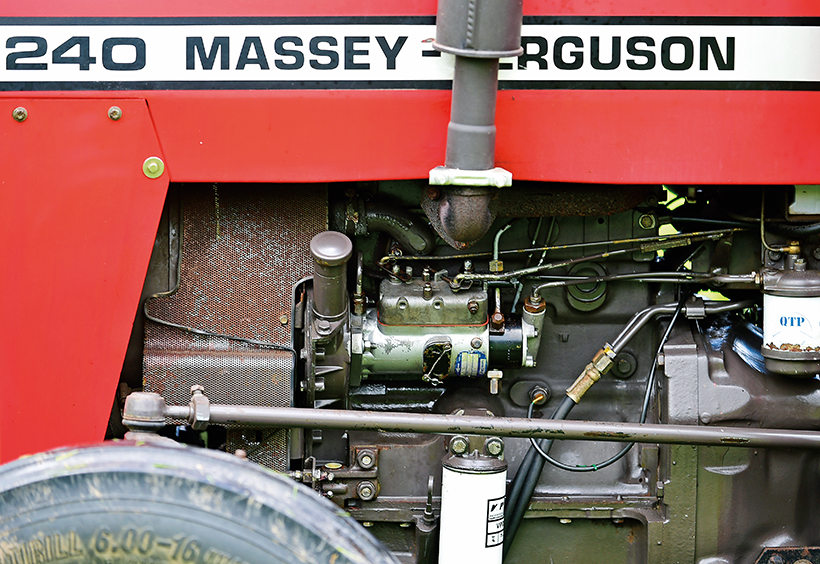
The low-hours, three-cylinder Perkins AD3.152 engine hasn’t missed a beat in the past 12 years. Peter reckons that it runs as sweetly now as it did on the day it left the factory!
“I was instantly interested in the 240 and arranged to go and have a look at it. Apparently it had been driven out of the original shed and required nothing more than a new battery to start, which sounded promising. Of course, replacing the battery on a cabbed 240 isn’t quite as simple as it is on other models, as the whole cab needs to be slid an inch or two forward on its mountings to provide the necessary clearance.”
Positive impression
When Peter first saw the 240 he was immediately impressed. “It was fitted with a brand new set of tyres, looked both complete and straight and seemed to run well. So, after a quick drive around the yard, I satisfied myself that all was well and agreed to buy it. At that stage the tractor was about 10 years old, although it wasn’t clear how long it had been standing idle.
“When I got it home I took my time thinking about what to do next. Initially I did wonder about fitting a front loader, but that never happened and I’m glad it didn’t. I did buy and fit a weight frame to the front end, though.
“I rent about 15 acres in the village and make hay on about 10 acres of it, and the 240 helps every year with that. I bought a little New Holland disc mower which, at £300, turned out to be one of the best bargains ever! I also use the tractor for harrowing and rolling during the season, and it really excels at all those jobs. I’m very happy that it’s not a concours machine as I still feel able to use it exactly as its designers intended.
“Granted, the tinwork is a bit rusty in places but, to be honest, that doesn’t really concern me. Part of me wonders if I should consider a bit of spray work, but where do you stop? It’s a dilemma but, as things stand, I’d prefer to preserve the tractor’s history for all to see, rather than lose it completely under a fresh coat of paint.”
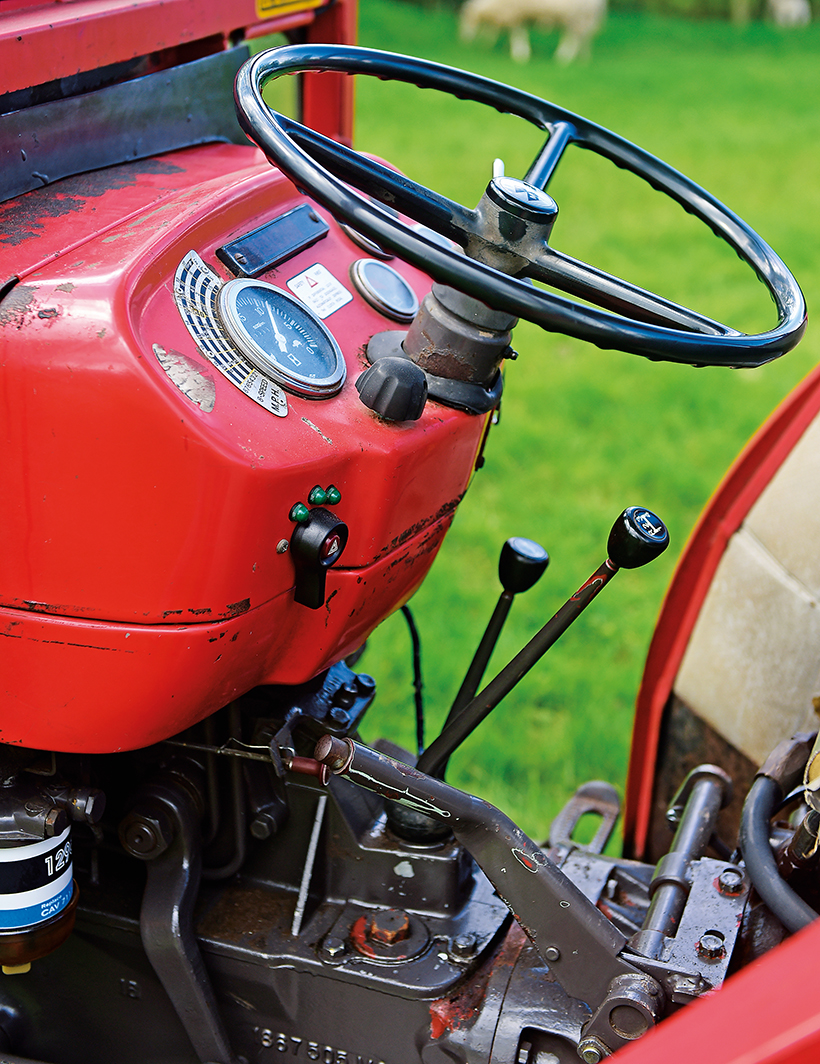
The tractor required a new relay recently, to get the indicators working. There’s also an issue with the windscreen wiper motor, which died. But these are minor niggles in the overall scheme of things.
One of the most amazing aspects of Peter’s tractor story is the reliability he’s enjoyed with the MF 240. “The most serious mechanical issue I’ve experienced,” he explained, “occurred about five years ago and related to the fuel system. The engine simply died one day, after a hay-making session. I called my friend Eric, who is an excellent engineer and helps me with mechanical repairs and, after I’d explained that I didn’t think it was anything simple like a lack of fuel or an air lock, he diagnosed a sheered diesel pump drive, which turned out to be correct.”
Sticky fuel
According to the diesel pump specialist who made the repair, the likelihood was that the dreaded ‘diesel bug’ had played a part in the problem. Apparently, this can cause standing fuel to thicken and turn sticky, which then creates too much resistance for the pump. The tractor had been idle for about six months so, nowadays, I’m careful to avoid that level of inactivity. I also use a fuel additive to guard against fuel deterioration. A new pump had to be fitted and that cost me about £240.”
Peter continued: “I also discovered a hydraulic issue a couple of years ago. The rear linkage was evidently starting to struggle when lifting the mower, and testing revealed that the system was running at 200-300psi below its recommended pressure. The cause was traced to a faulty pressure relief valve, which was simple to rectify. So I don’t think that two, relatively minor mechanical issues is too bad over 12 years of ownership, especially as the tractor is still put to work every summer.”
At other times of the year the 240 attends shows and Peter is a long-standing and keen member of the Ferguson Club. “The 240 always generates quite a bit of interest at events,” he added, “and I think this is because of its relative rarity. You just don’t see many 240s out and about nowadays, which is slightly odd. I’m sure it must have been a popular model back in the day and assume that many thousands rolled out of the Banner Lane factory. Maybe lots of them went for export, or were shipped abroad at the end of their working lives here.”
Future work
With regard to the 240’s present condition, Peter is aware that there are a few jobs brewing, although they are straightforward, age-related issues rather than anything more serious. “I think there’s a bit of wear creeping into the steering,” he told me, “as I’ve notice it becoming a bit wandery, so that’ll require some re-bushing work in due course. Likewise, I’m aware that the brakes are a little long in the tooth and, while they still work well enough, an overhaul will need to be scheduled.
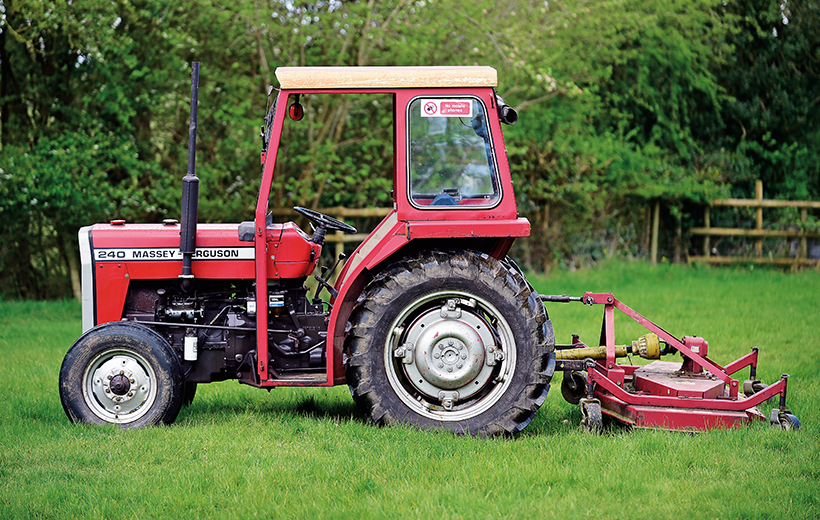
The cab has lost both doors but remains a bit of a struggle to use. Getting in and out is quite awkward due to the prominent gearbox casing and levers, especially with big boots on!
“I do all my own routine maintenance and make a point of changing the engine oil every year, regardless of how much they’ve been run. I remember back on the farm we used to change the oil twice a year, using thinner, ‘winter oil’ during the colder months, then switching back to conventional lubricant for the spring and summer. Undoubtedly oils are a lot better nowadays and, given that the 240 is only really worked properly during the harvest season, I think one change a year is perfectly adequate.”
Structurally, the tractor appears very sound, and much of that is down to its low hours and the way it’s been looked after. “The cab is decent and pretty sound as far as corrosion is concerned,” Peter says, “as is the rest of the tinwork. My impression is that it was kept under cover during its working life, which is why there’s so little rust now. That’s been the case since it’s been with me, too. Nevertheless, I’m still very impressed by how well the 240 has lasted.”
Impressive durability
“I know that my example probably led a relatively relaxed life, but it’s easy to forget that it’s now a 45-year-old machine. I think it’s survived incredibly well and I’m sure that, back in the day, the Massey Ferguson designers never imagined that the machines they were creating would be so durable. The same applies to my grey Fergie. That’s nearly 70 years old now and is still going strong; a real testament to the quality of the engineering involved. I really can’t see today’s tractors still being functional 50 years from now – they’ll have been written-off long before they get anywhere near that age, I think.
“As far as I’m concerned, the MF 240 has a great deal going for it and I can’t think of a single, serious downside that’s presented itself to me over the past 12 years. There are a few niggles, of course, as with any tractor. But, overall, it’s an excellent and accomplished machine. At a day-to-day, practical level, probably the biggest gripe I have is the restricted access. The position of the gear sticks and the high gearbox casing make getting in and out of the cab more of a struggle than it should be, especially if you’ve got big boots on!
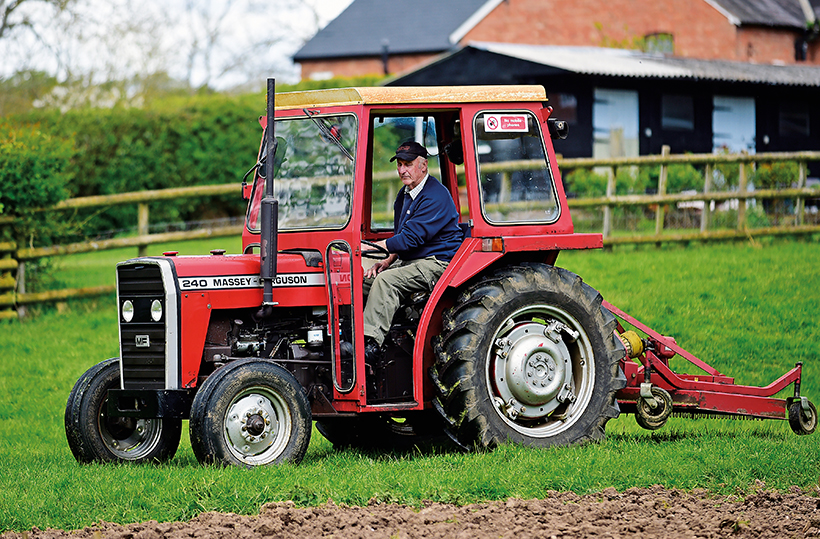
Peter loves the compact size of this tractor and the performance that its 46hp Perkins engine delivers.
“But, on the plus side, it’s a powerful tractor for its size and a very willing worker. The combination of compact size and well-weighted (optional) power steering mean that it’s easy to control and very manoeuvrable when working. The three-cylinder Perkins AD3.152 engine is a joy as well; a cracking little unit that I reckon is as good today as it was the day it left the factory.”
Well, you can’t really get more of a ringing endorsement for a tractor than that. Peter Archer has a lifetime’s experience with tractors and heavy machinery to call on, and has been living and working with this late-1970s classic for more than a decade. He has nothing but praise for the machine as a whole, and can’t quite understand why there aren’t more in enthusiasts’ hands. “Owning this tractor really is better than having cash in the bank. It’s an appreciating asset that, as well as being immune to inflation, remains a productive, useful and interesting machine to have. I really couldn’t ask for more from a working classic tractor.
This feature comes from the latest issue of Tractor & Machinery, and you can get a money-saving subscription to this magazine simply by clicking HERE

Previous Post
Interesting classics at the Cuckoo Spring Fayre

Next Post
1936 Fordson Model Y gets ‘conservation’ restoration



